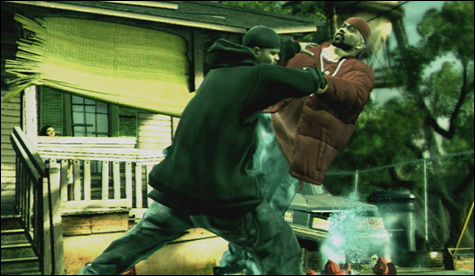
INSULTING: Can the hip-hop veneer excuse the putrid gameplay? |
Def Jam: Icon is a marketing memo disguised as a video game, a conceptual nightmare that collapses under the weight of brand names and ill-advised “synergy.” The idea of a fighting game starring famous rappers was funny the first time, tiresome the next; now it seems a calculated insult. EA isn’t even attempting to cloak its cynicism. Product placement is one thing, but Def Jam: Icon is nothing but ads: ads for shoes, ads for music, ads for the rappers themselves. And all that would be okay if the gameplay were remotely competent.
This game is so bad in so many ways that it’s hard to know where to begin. Character movement isn’t just sluggish — it often seems the fights are taking place underwater. The motion-capture process that gives each character realistic animations also hamstrings the combat mechanics. Head-to-head fighters should be hyper-responsive, allowing you to time your maneuvers down to the frame. Here, each move is displayed from beginning to end, which means far too much time spent not in control of the action.
The payoff to a fight is rarely worth it either. Each arena is supposed to be interactive, although the interactivity is limited to the two or three portions of each background that are exploding to the rhythm of whatever song is playing. It’s ridiculous, like watching the bedlam that erupts in Pee-wee’s Playhouse when somebody says the secret word. But since the hazardous environments are deadlier than any punch or kick, each fight is a race to see who can toss the other guy into more explosions. Also touted as a feature is the ability to set off any of the explosions by pantomiming a record scratch in mid air (using the right analog stick to represent the record album). There’s a certain charm to the idea of telekinetic rappers, but after you’ve seen it once, you’ve seen it as much as you need to.
As boring as the combat is, what comes between bouts is downright stultifying. On paper, your user-created character travels the world, hobnobs with up-and-coming talent, and haggles with radio stations to play your artists’ latest tracks. In practice, this means reading your e-mail. Between each fight, you arrive home to find an ever fuller inbox packed with messages from clients, businessmen, and lawyers. (Oh and you also hear from a gold-digging girlfriend whose shrewish demands include jewelry and trips to Europe.) If we’re going to combine the brutality of street fighting with the thrills of receiving e-mail, how about a game where you can beat the snot out of the guys who send you dozens of spam messages a day with subject lines like “Increase your boner capacity!” I’d play that game.
It’s fair to ask whether I’d find Def Jam: Icon more palatable if it took place in a musical world I’m more enamored of — especially since the game is aimed at rap fans first and gamers second. And the truth is that I wouldn’t mind pitting Cat Power against Stephen Malkmus in Matador: Icon. The appeal is clear if you’re a fan of the songs and the stars on display. Electronic Arts is selling the image. But does that excuse the putrid gameplay? No. Emphatically, no. It’s not for me, but the hip-hop veneer isn’t the problem. The problem is that Def Jam: Icon was conceived and executed by PR flacks instead of by video-game designers. I don’t hate the player. I hate this game.